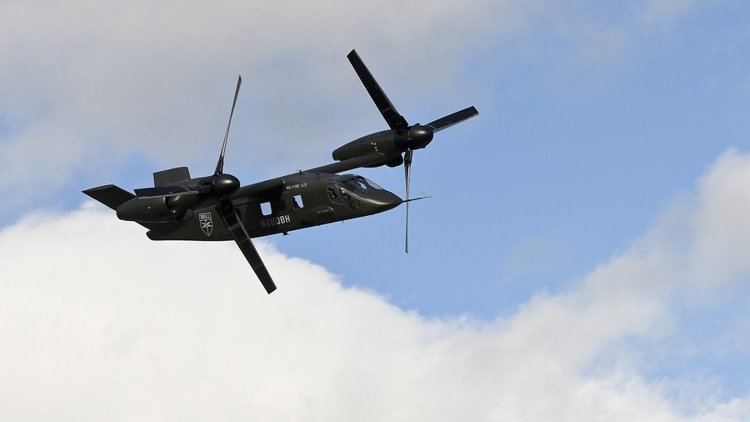DALLAS — Texas has surpassed Virginia in defense spending, new estimates from the U.S. Department of Defense show, and Dallas-Fort Worth is a big reason why.
Texas captured an estimated $68.4 billion in total defense spending and $55.5 billion in contract spending in 2023, surpassing traditional powerhouse Virginia in both categories, according to the Defense Department's Office of Local Defense Community Cooperation report. About half of DOD's contract funds were for supplies and equipment such as aircraft, ships, weapons and parts.
The report underscores the state's ascendance as powerhouses for defense. And while the DOD full county-level report on spending won't be out until this fall, previous reports have shown DFW makes up a large chunk of the contract spending in the state. In 2022, Tarrant, Dallas and Collin counties saw $29.21 billion of the total $45.6 billion in Department of Defense contract spending in the state, or about 64%. The defense industry's large presence in DFW is getting the attention of site selectors and those working in economic development on the local and state levels and affecting their strategy as they recruit companies.
A report from Evan Stair, managing director of analytics at Columbus, Ohio-based Vista Site Selection LLC, notes Texas has grown its share of defense spending by about 10% in the past decade, while Virginia has stayed relatively stable. The report states Texas "has traded its cowboy hat for a fighter jet helmet."
Virginia, located next to the nation's capital, has long been the dominant state in terms of defense spending, garnering billions in contracts and serving as home to major institutions such as the Pentagon. Virginia, however, has more of a concentration of administrative and support functions.
"While Virginia’s spending remains high, Texas’s broader approach — covering everything from defense manufacturing to cyber operations — is paying off big time," the Vista report states. "Think of it like Texas having more plays in its book, whereas Virginia is leaning on a strong, but narrower, set of strategies."
Barry Albrecht, CEO of Strategic Location Services, a Washington, D.C.-based site location firm exclusively for the defense industry, has met with organizations such as the Dallas Regional Chamber to speak about the industry's large presence and opportunity.
Why is DFW is leading the way in Texas with the defense industry? One major factor is the workforce, Albrecht said. More than 118,000 people in DFW have a security clearance, beating the San Antonio area, with about 90,000, according to his firm's research. An estimated 358,000 veterans live in the Dallas area, according to the U.S. Department of Veteran Affairs. And the area is host to nine universities that have engineering programs.
"Over the years, Texas has done a very good job of supporting the defense industry, both legislatively [and] at the state level," Albrecht said. "And right now, there's companies, defense companies, recruiting engineers from around the country in the DFW area."
Defense giants also have a firm footprint in the area. Lockheed Martin, the top recipient of defense contract money in the state with $23.3 billion in 2022, has several factories in the region such as Lockheed Martin Aeronautics' F-35 assembly plant in Fort Worth and the company's Fire and Missile Control in Grand Prairie. DFW is also home to the first high-energy laser weapon factory at Raytheon in McKinney, part of the company's multibillion-dollar presence in the city. General Dynamics' Ordinance and Tactical Systems recently opened a new artillery projectile metal parts facility in Mesquite.
Matt Samler, senior managing director of Vista, said most of those companies have made major investments in the region in the past few years.
"The DFW region has literally the 'who's who' of this industry already here," he said.
The aerospace and defense industry is one of several targeted industries the City of Fort Worth is trying to attract, according to its updated economic development strategic plan. Robert Allen, CEO of the Fort Worth Economic Development Partnership, said targeting the industry will be a key focus for the organization.
"We are working, I will say, a handful of aviation-related projects as we speak," Allen said. "I think we present in Fort Worth exceedingly well from a talent pool perspective, and then again, as kind of a known quantity perspective, because we've done it before on multiple occasions."
Fort Worth-based Bell Helicopter Textron Inc. has applied for school district tax breaks for a potential $429 million advanced manufacturing plant in far north Fort Worth. The company has secured a contract from the U.S. Army to manufacture a next-generation tilt rotor attack helicopter called the Bell V-280 Valor, which eventually will replace the Black Hawk. That contract could potentially be worth $70 billion over the course of decades.
Fort Worth City Council is currently considering a tax break for the maintenance arm of Embraer Aircraft Maintenance Services, which is seeking to spend $42 million on property and $15 million on equipment for a facility on 15.8 acres in Alliance.
Bethesda, Maryland-based Lockheed Martin Corp. (NYSE: LMT) is the top employer in Tarrant County, with around 18,700 workers, according to Tarrant County data. Naval Air Station Joint Reserve in far west Fort Worth employs 10,500. and Bell Textron is the county's third-largest industrial taxpayer.



